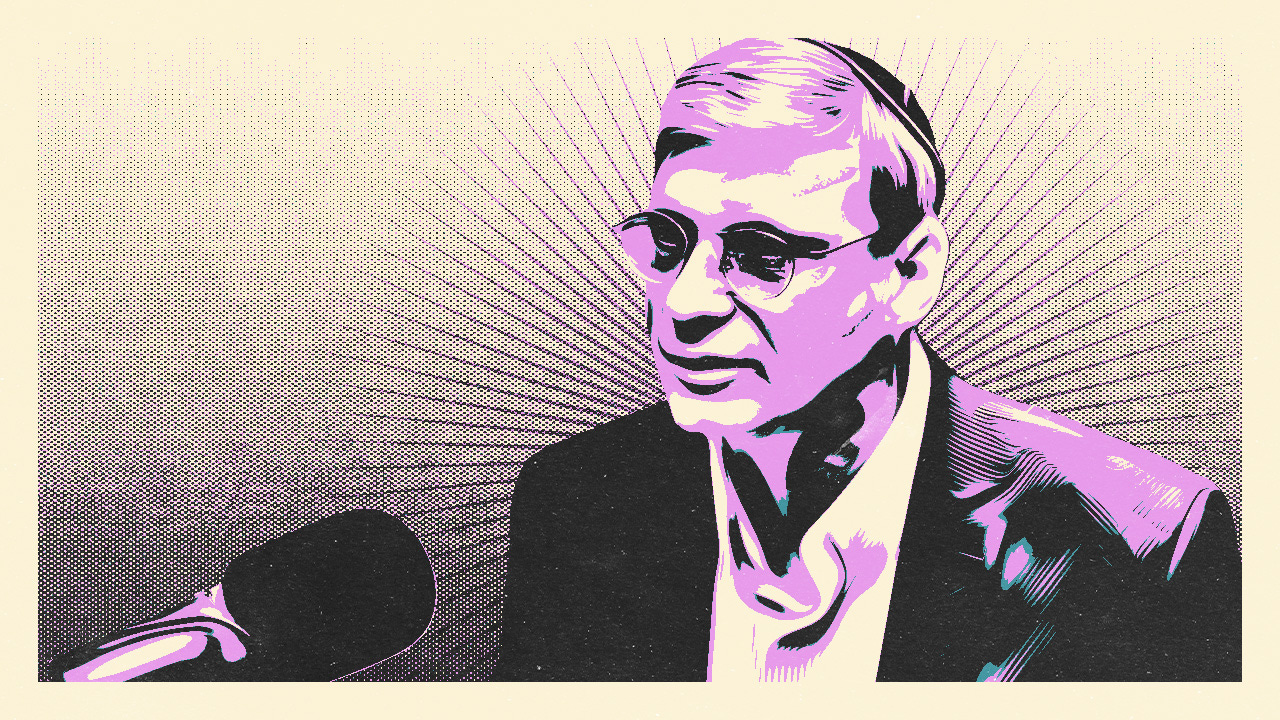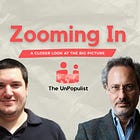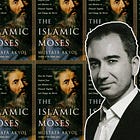Yoram Hazony’s National Conservatism Wants to Abandon Liberal Democracy so that the Jewish People Maintain Hegemony in Israel
He wants to give Protestant America the right to disempower other faiths and ethnic groups so that Israel can do the same
The Israeli political theorist, Yoram Hazony, recently appeared on The Ezra Klein Show to defend his vision for society. Hazony is best known as the leading luminary of the National Conservatism project that arose in the late 2010s to supply the nascent—and largely inchoate—Trump movement with an intellectual substructure (a review of Hazony’s 2018 book, The Virtue of Nationalism, called it “the closest thing to a manifesto for intellectuals on the right”). Klein framed the conversation around the emerging importance of Vice President JD Vance, an active participant at several Hazony-led NatCon conferences over the years, as a key ideological driver behind President Donald Trump’s political agenda. The rise of Vance, who shares with Hazony a deep skepticism of liberal values like diversity and multiculturalism, has made the NatCon founder’s social vision more relevant than ever.
Hazony’s thinking starts with the core idea that a nation is, as he conveyed to Klein, “a collection or a group of tribes that are bound together by mutual loyalty and that share certain characteristics—usually it’s a language; often it’s a religion; in most cases it’s a common history of joining together against common enemies.” This definition rejects the possibility that ideas, especially Jeffersonian liberal democracy, can serve as the glue of a diverse state. More than any other element in Hazony’s list of ingredients that make up a nation, Vance and many in the NatCon movement more broadly have concluded that religion, and specifically Christianity—of the Protestant variety—should serve as the defining identity of America.
The illiberalism is obvious—but finding a way to counter the increasing influence of Hazony’s thinking requires seeing how his career as a political philosopher in Israel shaped his thinking, and how he misunderstands the role of religion in American society.
The Making of a Nationalist
In 1995, Hazony, who comes from the right of center intellectual tradition in Israeli politics, offered a cogent argument that the evil at the heart of the Book of Esther was King Achashverosh’s decision to centralize all power in a single strongman, Haman, which Hazony saw as a form of idolatry. Better and more democratic was the truth approximated by a group of advisors, Hazony contended. But the fact that Hazony’s endorsement of liberal democracy was published in the middle of the Oslo peace process, which aimed to secure a lasting peace among Israelis and Palestinians in the 1990s, is revealing.
At that point, almost all Jews and most Israelis were preparing themselves for a world with a Palestinian state alongside a democratic Jewish one. (I have written about my ongoing support for this vision previously in these pages.) But we know now what Hazony did not in 1995. The second Camp David Summit failed in July of 2000, Ariel Sharon took his walk on the Temple Mount, and the Second Intifada broke out in September. That left Jewish intellectuals with a demographic problem, because without a two-state solution, Jews in an Israel that controls all the territory between the Jordan Valley and the Mediterranean would soon be numeric equals with Palestinians, instead of the 80% majority they’d be in pre-1967 boundaries beside a newly formed Palestinian state.
Thus, Hazony’s prior ideas about “democracy” had to be reinterpreted, and what he came up with is a renewed enthusiasm for ethnic nationalism. Since electoral parity would soon be impossible to avoid, he theorized that all healthy democracies rely upon a cultural center with one religio-ethnic group holding things together. Minority groups could remain, under this vision, but only at the whim of the dominant identity group.
This was the ideology that propelled Israel’s Nation-State bill, passed by the Knesset in 2018. Since Israel has no constitution, “Basic Laws” such as this one serve the same function. The Nation-State law declares, “The State of Israel is the nation state of the Jewish people”—an assertion of ethnic primacy that, unlike Israel’s Declaration of Independence, intentionally excised language protecting the rights of all citizens, regardless of religion.
The goal was to create the basis for denying rights to non-Jews living within Israel, which is why the current government, led by Benjamin Netanyahu in his sixth term as prime minister, announced a series of “judicial reforms” that would significantly limit the Supreme Court’s capacity to constrain the government in power.
This move, a legal prerequisite to annexing the land where five million Palestinians live in the West Bank and Gaza, is precisely why Hazony’s definitions matter. Make a state’s core identity synonymous with a religio-cultural “nation” and everyone else’s rights become contingent. It will give Israel the right to absorb Palestinians within itself but without granting them political rights that would jeopardize Israel’s existence as a Jewish state.
Hazony’s Ahistorical America
But in reverse-engineering a nationalist intellectual framework in support of his illiberal vision for Israel, Hazony exported and applied his insights to the United States. However, in doing so, the flaws in his account become all the more glaring.
He endorses an explicitly Christian America but ignores the:
15 centuries of Christian-centered kingdoms wreaking havoc on their own citizens, especially Jews;
ways that a focus on secular dominion ends up corrupting Christian theology, marginalizing God’s kingdom, and justifying all sorts of sin;
mountains of historical evidence against the idea that the Founders wanted America to be officially Christian;
obvious constitutional arguments against the establishment of a single church.
Perhaps the biggest historical invention is Hazony’s idea that George Washington favored an explicitly Christian America. But as Jerome Copulsky explained in his book American Heretics: while Washington in his Farewell Address stressed “the importance of religion and morality as ‘indispensable supports’ for ‘political prosperity,’” Washington had not “called for the establishment of a national church or demanded that the Constitution of the United States acknowledge divine authority.” “And,” Copulsky adds, “he was adamant that in America religious liberty was a fundamental right.”
Hazony, of course, needs an ahistorical Washington in order to set up his nationalist account of the Founding. But his flawed history is by no means confined to the early days of the Republic. In the Klein interview, Hazony says:
The fact that [America] was a Christian country, that up until the 1930s the Supreme Court still referred to Americans as a Christian people, that it was legally a Christian country, that it was culturally run by Protestants—that didn’t prevent it from being, despite its many flaws, something that was really beautiful and superior to many other countries in the world.
Even more disturbing than the factual inaccuracy of this statement is Hazony’s choice to call the peak era of American antisemitism and Jim Crow violence “really beautiful.” But that’s just it—Hazony’s project of turning back the clock can only function as such if it is sanitized of the messy historical realities that a proper account of the past would make sure to include.
These logical and moral flaws emerge because Hazony’s project is bigger than religion. He is trying to redefine the basis for the American project, replacing the Declaration of Independence—and its reliance on the primacy of universal human dignity—with American Protestantism. This is the endgame. And its purpose is to create the political space for Israel to even more aggressively disempower non-Jews.
Already, in Israel, rights are denied first to Palestinians living under military occupation, then to those deemed threats to the state, then to all non-Jews. Already Arab citizens of Israel suffer a plethora of legally and socially sanctioned forms of exclusion. In America, the denial of rights begins with the ever-expanding number of “undocumented” ensnared by our judicial system, then to those whose legal status can be rejected for some politically-exploitable reason, and then to those who fall outside of whatever the administration determines to be a citizen. Note Trump’s recent call for a new census to diminish congressional representation for blue states. The 2026 midterms are on the horizon. This is how authoritarians win elections.
Hazony’s Naïve Conception of American Christianity
Hazony’s vision is also sociologically and theologically naïve. Which of America’s tens of thousands of Christian denominations should be the dominant strand of Protestantism that is supposed to forge our national cohesion? Set aside the old Catholic/Protestant divide, even Presbyterians, probably the most intellectual and procedure-oriented strand of Christianity, cannot agree on which version of their theology is correct. In the 19th century, almost every Christian denomination split over questions of slavery, something evangelical historian Mark Noll called a theological crisis within American Protestantism. Today, the United Methodist Church has split over the inclusion of LGBTQ members and clergy. Which Christianity is Hazony talking about?
Israel is illustrative: its establishment of “Judaism” is the elevation of Ultra-Orthodoxy. The government of the Jewish State invalidates my Reform Jewish rabbinic leadership and thus my weddings, conversions, and practices. In 2018, after the Pittsburgh synagogue shooting, the Israeli governmental rabbinate referred to the building as a “Jewish center” so as not to acknowledge its religious character. Women who try to pray with a Torah at the Western Wall (including my daughter) get physically attacked while the IDF looks on. So what starts as a project to protect Jews turns against them.
For America, Hazony is after a cohesion-ensuring Protestantism—but that is only possible by repressing communities not in theological alignment. He isn’t wrong that, as a historically contingent matter, American democracy has always depended upon Christianity. Jonathan Rauch’s new book, Cross Purposes, calls American Christianity a “load-bearing wall” for our democracy because, as he noted to The UnPopulist, the American Founders’ constitutional framework for republican self-government depends for its proper functioning on the virtue in the public that Christianity provides.
But while Rauch cites Christianity as a historically crucial source of our democratic virtue, Hazony wants to make it our national identity. Here’s the all-important difference: The first approach, making space for a robust expression of Christian faith, is compatible with and even conducive to the flourishing of American liberal democracy, while the second approach, officially superimposing American Protestantism onto our national identity, ends up repudiating the rights and freedoms central to the American constitutional project.
The Centrality of Religious Freedom
America has always rejected a single religious dogma; it is the opposite of a theological monolith. We have 249 years of history arguing for the shared virtues that come from diverse faiths. Thomas Jefferson’s deism anchors the thinking in the Declaration. He refused, even when running for president, to endorse a specific Christian doctrine. Our democratic virtues have always been rooted in universal principles common to all religions—the authority of a non-human divinity, a set of moral obligations for public behavior, and a network of local institutions that enable common citizens to practice democratic leadership.
This can work because American religion depends upon the centrality of the house of worship as America’s essential mediating institution. Those institutions thrive internally because of their theological and cultural particularity—the specific doctrines, practices, and rules for covenantal membership that make them vibrant and spiritually rich only because they have the freedom of self-definition. The very ideas, habits, and attitudes that differentiate religious traditions are the things that make a house of worship feel alive and inspire the average citizen to higher moral and civic character. The rights and freedoms of the American liberal order allow this specificity precisely because no single strand of Christianity officially or culturally dominates any other strand or another religion.
The genius of American religious freedom is to generate civic virtue from the combined effect of differing particular faiths inside institutions, and universal respect for differing religious sincerity surrounding those institutions. The diversity that Hazony disparages is essential to the system.
I am not advocating a watered-down interfaith culture, where all faiths hide their differences. Defanging fanatical faiths that advocate domination is consistent with upholding the Founders’ vision of religious freedom, because officially privileging a particular faith means practitioners of the other ones lack the freedom to live theirs out. But that does not mean seeking to do away with religious difference. America’s strength has been the convictions we find in our theological differences held in creative tension because we share spiritual habits like prayer, study, gathering, the pursuit of beauty, and acts of kindness and justice which make human life meaningful. This spiritual common ground enables us to practice values like honor, respect, and dignity toward other theologies that are not our own.
In 2025, as Hazony’s ideology is on the rise, we need more exposure to how other people express their sincerely held beliefs, especially when those beliefs differ from our own because an appreciation of what a faith means to its adherents makes it harder to take it away from them. When I pray with my Baptist friends, I am moved by the integrity and power of their yearning, as well as the specific moral message they express. Over the years, I have learned how to say “Amen” under my breath before they say, “In the name of Jesus.” My synagogue has been hosting Muslim worship on Friday afternoons for almost 20 years, and I swear I can feel the spiritual energy of those 500 voices in prayer reverberating from the walls a few hours later when my fellow Jews arrive for Shabbat worship.
The national observance of America’s upcoming 250th anniversary offers a unique moment to elevate this largely overlooked multi-faith ecosystem. While patriotic parades, picnics, barbeques, and kids in tricorn hats will be joyous, the moment also deserves a serious consideration of the deeper message of this American endeavor, namely, that within the shared space created by universalism different particular traditions flourish, completely through voluntary participation. (In that spirit, I’ve helped create a program called faith250 to promote a deeper observance of America’s semiquincentenial to reaffirm the religious habits we have in common while celebrating the religious particularity that separates us.)
The spiritual expressions we share in common are the gravity at the core of American democracy. Hazony misses this point, I think deliberately, because his thinking is inherently exclusionary, requiring an interpretation of “democracy” that in the state of Israel prefers Jews over Palestinian Muslims and Christians. Accepting America as an officially Protestant nation where other religions are relegated to lesser status creates the intellectual precedent for Israel to do the same for non-Jews. Ironically, Hazony cannot get away from the need to universalize to ground his own project. Putting aside the massive problems with this social vision for Israel, when it comes to the United States, empowering a particular American Christianity (never mind which Christianity) never has been and never should be the basis for our national identity.
© The UnPopulist, 2025
Follow us on Bluesky, Threads, YouTube, TikTok, Facebook, Instagram, and X.
We welcome your reactions and replies. Please adhere to our comments policy.











Hazony’s project not only makes life precarious for Palestinians, it would have the same effect for diaspora Jews if implemented in their countries. It would therefore both pave the way for annexation in Israel and promote aliya (Jewish migration to Israel).
I appreciate very much your highlighting the inherent issues in Hazony's national conservatism, especially as it relates to the United States and the precedent Hazony is trying to set for Israel. I would only add, speaking as a main-line Presbyterian Christian pastor, I am very concerned about the dangerous idea of "empowering a particular American Christianity" and I very much do mind "which" Christianity. And I could not agree with you more that this never has been and never should be the basis for our national identity. Thanks again for writing this article.